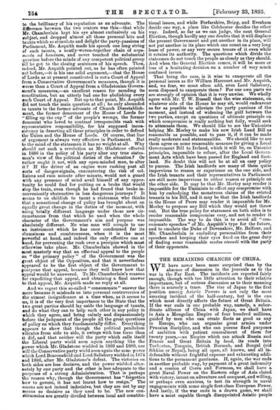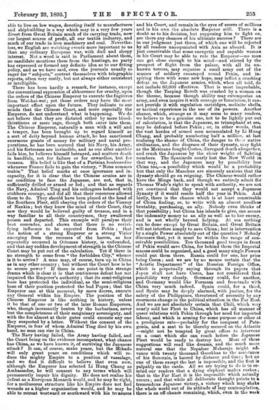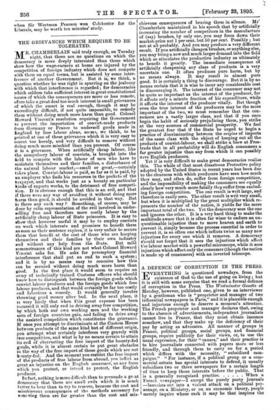THE REMAINING CHANCES OF CHINA.
WE have never been more surprised than by the absence of discussion in the journals as to the war in the Far East. The incidents are reported fairly enough, though with too little attention to their relative importance, but of serious discussion as to their meaning there is scarcely a trace. The rise of Japan to the first position among Asiatic Powers is not only the most amazing incident of the half-century, but is the one which most directly affects the future of Great Britain. If the war ends in one probable way, namely, a subor- dinate alliance of China with Japan, we shall have in Asia a Mongolian Empire of four hundred millions, guided by men who can create fleets as good as any in Europe, who can organise great armies under Prussian discipline, and who can pursue fixed purposes of ambition with patient concealment of them for twenty years,—an Empire which can attack Russia and France and Great Britain by land, its roads into Turkestan, Tonquin, British Burmah, and Bengal (vid Sikkim or Nepal), being all open, all known, and all in- defensible without frightful expense and exhausting addi- tions to the permanent garrisons. If, again, the war ends in another probable way, by payment of a great indemnity and a cession of Corea and Formosa, we shall have a great Naval Power on the Eastern edge of Asia elated with victory, intent on adventure and conquest, and willing, or perhaps even anxious, to test its strength in naval engagements with some single first-class European Power. And lastly, if the war ends in a drawn game, we shall have a most capable though disappointed Asiatic people able to live on low wages, devoting itself to manufactures and shipbuilding in a way which may in a very few years divert from Great Britain much of its carrying trade, now our largest source of profit, all our textile industry, and much of our trade in iron machinery and coal. Neverthe- less, we English are watching events more important to us than any ordinary European war, with dull and sleepy interest. Not a word is said in Parliament about them, no candidate mentions them from the hustings, no party has expressed or formed any definite idea as to our fitting policy, and as we have said, even the journals usually .Ta eager for "subjects," content themselves with telegraphic reports, often very costly, but not always either consistent or intelligible. There has been hardly a remark, for instance, except the conventional expression of abhorrence for cruelty, upon the orders of the Chinese Emperor to execute the fugitives from Wei-hai-wei; yet those orders may have the most important effect upon the future. They indicate to our minds that the Chinese Court, and more especially the Emperor, do not understand what is happening. We do not believe that they are dictated either by mere blood- thirstiness or mere rage, though both enter into them. The Chinese Emperor, naturally a man with a will and a temper, has been brought up to regard himself as a sort of deity beyond human attack, he has sanctioned enormous grants of money for military and naval pre- parations, he has been assured that his Navy, his Army, and his fortresses are invincible, and as one after another fails him, he believes himself betrayed, and scatters death in handfuls, not for failure or for cowardice, but for treason. His belief is like that of a Parisian boulevardier whenever France fails to gain the victory, " Nous somnies trahis." That belief marks at once ignorance and in- capacity, for it is clear that the Chinese armies are in no condition to face the Japanese, are not, that is, sufficiently drilled or armed or fed ; and that as regards the Navy, Admiral Ting and his colleagues behaved with stubborn courage, and did all that their resources allowed them to do. They should have been placed at the head of the Southern Fleet, still obeying the orders of the Viceroy of Nankin; but they knew the mind of their Court, they saw they would be believed guilty of treason, and in a way familiar to all their countrymen, they swallowed poison and departed. This example will paralyse their best comrades, and shows that there is no revivi- fying influence to be expected from Pekin ; that the notion of a strong Emperor or a strong Vizier emerging from the recesses of the harem, as has repeatedly occurred in Ottoman history, is unfounded, and that any sudden development of strength in the Chinese Court may be put out of the calculation. Yet if there is no strength to come from "the forbidden City," whence is it to arrive ? A man may, of course, turn up in China as in any other country ; but without the Court how is he to secure power ? If there is one point in this strange drama which is clear it is that continuous defeat has not impaired the Emperor's authority ; that its semi-religious base has protected the individual, as the semi-religious base of their position protected the bad Popes ; that the Emperor can at this moment, by mere decree, execute any General within his Empire. The position of the Chinese Emperor is like nothing in history, unless it be that of one or two of the later Roman Emperors, who, though incessantly beaten by the barbarians, never lost the completeness of their sanguinary sovereignty, and with the foe almost at their gates could execute any one they suspected by a letter. Without the consent of the Emperor, in fear of whom Admiral Ting died by his own hand, no man can rise in China.
The Navy having failed, the Army having failed, and the Court being on the evidence incompetent, what chance has China, as we have known it, of surviving the Japanese attack ? It can, of course, make peace, but the Mikado will only grant peace on conditions which will re- duce the mighty Empire to a position of vassalage, and we find it difficult to believe that even now, although the Emperor has selected Li Hung Chang as Ambassador, he will consent to any terms which will permanently impair his dignity. He does not realise his defeat as a European Monarch would, and he may be right, for a molluscous structure like his Empire does not feel wounds as a higher organisation would, and he may be able to retreat westward or southward with his treasures and his Court and remain in the eyes of scores of millions and in his own the absolute Emperor still. There is a doubt as to his decision, but supposing him to fight on, are there any chances of his ultimate success ? There are in our judgment just three, of which one will be rejected by all readers unacquainted with Asia as absurd. It is just conceivable that some energetic and capable woman in his Court may be able to rule the Emperor—no man can get close enough to his mind—and stirred by the prospect of flight from the palace, with all its un- known terrors, may organise a small army out of the masses of soldiery encamped round Pekin, and in- spiring them with some new hope, may inflict a crushing defeat on the Japanese armies, which, when all told, do not include 80,000 effectives. That is most improbable, though the Taeping Revolt was crushed by a woman on the throne, because though ability may extemporise an army, and even inspire it with courage or fanaticism, it can- not provide it with regulation cartridges, melinite shells, or tactical experience in the use of its powers. Another chance, which, strange as it may seem to many readers, we believe to be a genuine one, not to be lightly put out of calculation, is that the Japanese, so triumphant at sea, may be defeated before Pekin ; or, in other words, that the vast hordes of armed men accumulated by Li Hung Chang, and. probably numbering half a million, at last realising the shame of China, the danger to th(.:1- native civilisation, and the disgrace of their dynasty, may fight as the Mexicans fought Cortes, disregard death altogether, and crush the Japanese by the sheer weight of fighting numbers. The Spaniards nearly lost the New World in that way, and the Japanese may by possibility lose China too,—a possibility which would be a probability but that only the Manchus are sincerely anxious that the dynasty should go on reigning. The Chinese would rather have the Mings back, and though we entirely admit Sir Thomas Wade's right to speak with authority, we are not yet convinced that they would not accept a Japanese dynasty if it would reside half the year in Pekin. And lastly, there is the chance which is at least conceivable of China finding, or, to write with an almost needless brutality, purchasing, an ally. Nobody even thinks of that possibility ; but China has islands to give, can secure the indemnity money to an ally as well as to her enemy, and is not wholly beyond helping. At sea nothing can be done except by Great Britain, and Great Britain will not interfere simply to save China; but is intervention by a single Power absolutely out of the question ? Nobody discusses that, yet it must be within the range of con- ceivable possibilities. Ten thousand good troops in front of Pekin would save China, for behind them the Imperial masses could be organised, and a good many single Powers could put them there. Russia could for one, her price being Corea ; and we are by no means certain that the "Asiatic Department" of the Russian Foreign Office, which is perpetually saying through its papers that Japan shall not have Corea, has not considered that possibility very closely. Germany could, for another, and Germany would like Formosa and free-trade with China very much indeed. Spain could, for a third, and Spain may be deeply alarmed, with justice, for the safety of the Philippines, threatened of necessity by any enormous change in the political situation in the Far East. And we are not absolutely certain that Chili, which very nearly sold her Fleet to China, which has all manner of queer relations with Pekin through her need for imported labour, and which is arming for some purpose or other at a prodigious rate—probably for the conquest of Pata- gonia, and a seat to be thereby secured on the Atlantic —might not be tempted by great offers to intervene on a coast which she can reach before the Japanese Fleet would be ready to destroy her. Most of these suggestions will read like dreams, and the much more natural one that the Nepalese Maharaja might ad- vance with twenty thousand Goorkhas to the assistance of his Suzerain, is barred by distance and time ; but no one of them except the last is impossible, and the fir i st s palpably on the cards. All we are trying to do is to re- mind our readers that a dying elephant makes rushes ; that in the Far East it is the impossible which actually occurs ; and that while all deliberate thought points to a tremendous Japanese victory, a victory which may shake the whole world out of its attitude of lazy contemplation, there is an off-chance remaining, which, even in the week when Sir Weetman Pearson won Colchester for the Liberals, may be worth ten minutes' study.




































 Previous page
Previous page